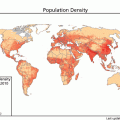Classification: ICD-9 051.9; ICD-10 B04
Syndromes and synonyms: Simian variola.
Agent: Monkeypox virus (MPV), a double-stranded DNA virus of the genus Orthopoxvirus, family Poxviridae. Two clades of monkeypox viruses are known: the West African virus and the Congo Basin virus. The Congo Basin strain is more virulent than the West African strain. The MPV genome is >96% identical to the variola virus genome. However, MPV is not a direct ancestor or descendent of variola virus.
Reservoir: Undetermined. Thought to be forest rodents (squirrels, rats, mice, dormice), shrews and monkeys in the rainforests of West and Central Africa.
Vector: None.
Transmission: By bite or direct percutaneous contact, mucosal or respiratory exposure to blood, tissues, fluids or lesions of infected animals. In Africa, transmission mainly occurs through butchering infected wildlife for food. Person-to-person transmission probably occurs through direct contact with infected tissue/fluid, respiratory droplet spread, and indirect via contaminated objects.
Cycle: Animal to animal, with occasional spill over to humans. Sustained human-to-human transmission has not been documented.
Incubation period: 7–21 days (mean 12 days).
Stay updated, free articles. Join our Telegram channel

Full access? Get Clinical Tree




